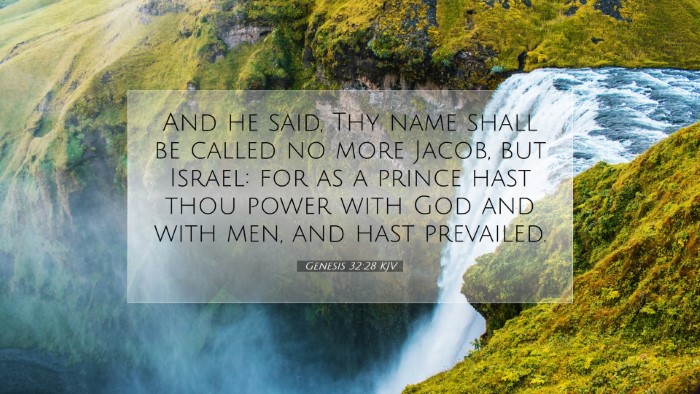Genesis 32:28: “And he said, Your name shall no longer be called Jacob, but Israel; for you have struggled with God and with men, and have prevailed.”
Commentary Overview
This verse marks a pivotal moment in the life of Jacob, encapsulating themes of struggle, transformation, and divine blessing. The renaming of Jacob to Israel not only signifies a change in identity but also points to Jacob's spiritual victory and the profound encounters he had with God. This commentary draws from the insights of Matthew Henry, Albert Barnes, and Adam Clarke, offering a multi-faceted exploration of the implications of this significant declaration.
Contextual Background
Jacob's life was characterized by strife and conflict, both with his brother Esau and within himself. The events leading to this moment reveal Jacob as a man who was constantly seeking God's blessing, often through questionable means. After years of laboring for his uncle Laban and reconciling with Esau, Jacob finds himself alone at Peniel, preparing for a possible confrontation. It is here that he wrestles with a mysterious figure—a divine manifestation—leading to his renaming.
The Struggle and Its Significance
Matthew Henry: Henry emphasizes that the struggle is symbolic of the challenges faced by all believers. It illustrates not only Jacob’s literal wrestling but also the internal struggles we face in our faith journey. He points out that Jacob’s determination to hold on and not let go until he received a blessing serves as an instruction for believers to persist in prayer and in their endeavours to attain God's favor.
Albert Barnes: Barnes reflects on the nature of Jacob's wrestling, suggesting that this encounter was not merely physical but spiritual. He argues that Jacob wrestled with an angel of the Lord, which represents God's providential hand in his life. This wresting symbolizes the necessity of engagement in spiritual warfare, a concept that resonates deeply in the lives of Christians as they confront adversities.
Adam Clarke: Clarke goes further to unpack Jacob’s response during the struggle, noting his tenacity and resilience. He refers to the metaphysical implications of wrestling with God as a transformational experience that leads to divine reassurances. Clarke argues that such encounters are necessary for believers to understand their purpose and identity in God.
The Name Change: Jacob to Israel
The act of renaming Jacob to Israel is profound and multifaceted.
- Identity Transformation: The transformation from Jacob, which means "supplanter" or "deceiver," to Israel, meaning "he who wrestles with God," denotes a significant shift in character, moving from a life of manipulation to one of divine engagement.
- Symbol of Victory: This new name is a testament to Jacob's perseverance. He wrestled with God and emerged not only physically but spiritually victorious. This serves as an encouragement to believers that struggles are often indicative of growth and divine intervention.
- Corporate Significance: Israel becomes the name associated with the covenant people of God. It signifies a nation borne out of divine promise, illustrating God’s plan for humanity through His chosen people.
Theological Implications
This interaction implies several theological themes worthy of exploration:
- God’s Sovereignty: God permits struggles and wrestles with His people to fulfill divine purposes. This theme echoes throughout Scripture, affirming God’s ultimate authority over human affairs.
- The Nature of Prayer and Struggle: The narrative encourages believers to engage deeply with God, illustrating that prayer often involves a wrestling that leads to spiritual growth and revelations.
- Covenant Relationship: Jacob’s renaming hints at the deeper covenant between God and Israel—both the individual and the collective—their relationship marked by struggle yet also by God’s faithfulness.
Application for Believers
For pastors, students, theologians, and Bible scholars, Genesis 32:28 offers profound life lessons:
- Embrace your struggles as opportunities for spiritual growth and divine encounters.
- Seek persistence in prayer, understanding that true faith may require wrestling with doubts and fears.
- Recognize your identity in Christ; just as Jacob was renamed Israel, believers are transformed into new creations under the new covenant.
- Encourage one another within the church to share struggles, understanding that together we are part of the covenant community, striving toward God’s promises.


